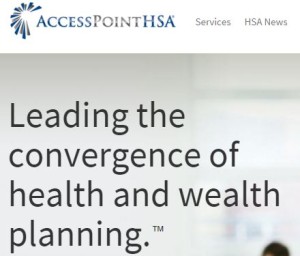 By Ryan Tiernan, Founder of Access Point
By Ryan Tiernan, Founder of Access Point
There is no arguing that employers are catching on to the shift from traditional “First Dollar Coverage” to a more consumer driven approach to providing healthcare for their employees. In this model, healthcare costs are shared between the employer and employee often through a high deductible health plan and a coinciding health savings account (HSA). In fact the 2015 SHRM Benefits Report shows that 43% of organizations currently offer health savings accounts, an increase of 8% over the last five years. The report also states that 30% of organizations offer employer contributions to HSAs which is a 10% increase over the last five years.
With this increase in both the adoption and the amount of employer dollars being contributed to these accounts have we stopped to ask how and why we are selecting our HSA provider partners? In the early days of the 401k it was a given that most of the 401k providers were very similar. Often offered by large banking institutions with relatively little investment selection or employee facing education the first 401ks were a bit of a black box and we asked very little of the providers. Today, the level of vetting, benchmarking, advisor and consultant input on selection and monitoring is enough to make an employer’s head spin. Fast forward to the dawn of the health savings account we may unfortunately have a similar starting point in that relatively few employers execute the level of due diligence deemed even elementary by 401k standards.
With this trend solidly in place should employers be paying more attention and giving more scrutiny to the HSA provider attributes previously overlooked? Although the overwhelming majority of HSAs are not ERISA covered plans should employers use a similar level of due diligence in the partnering process regarding HSA providers?
Investments within the HSA are one such attribute often overlooked. Recent research from Devinir shows that the bulk of HSA assets are currently residing in cash with only 13.3% of dollars set aside for longer term healthcare saving and investing. However this is a 34% increase from mid-year 2014 to midyear 2015. Investments within health savings accounts are something we may need to address head on.
Like most things in life, a well-articulated and process driven approach to a addressing a problem can work wonders to not only demystify the new and misunderstood but, also cast light on the best path forward. With that, the next time an employer meets with a group of advisers from both the benefit and retirement space it might do well to ask “How did we get here and is it the best way forward?”.
Access Point HSA helps financial service and employee benefit firms position, sell and leverage health savings accounts as a critical piece of a well-designed retirement income plan.


